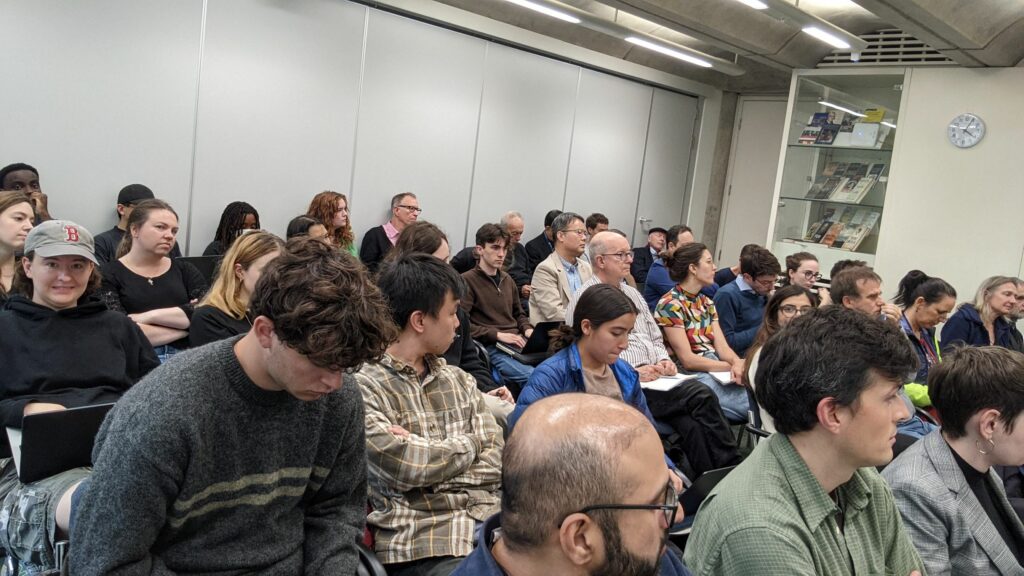Reflections from the Rothermere Institute Symposium #Oxford
This recent panel brought together a group of notable scholars – Melinda Cooper (Australian National University), author of Counter-Revolution and Family Values; Kristin Kobes Du Mez (Calvin University), author of Jesus and John Wayne; Joel Suarez (Harvard University), author of Labor of Liberty, forthcoming; and Noam Maggor (Queen Mary University of London), author of Brahmin Capitalism. – to explore the political and moral economy of the Trump Era United States. Their combined analysis is a vivid picture of how we arrived at our current political moment and the limited pathways out of it.

It was a really positive event, what’s striking is how much this conversation resonates not only in the U.S, but globally – particularly in the U.K., where the disintegration of the liberal centre is now fully visible. Over the last decade, we’ve seen the collapse of centrist consensus, leaving voters with a stark binary: hard right or hard left.
The collapse of the centre is leading us to the only way, is hard. In the U.S., when push came to shove, voters turned to the hard right, embodied in Trump and his sprawling ecosystem of grievance, authoritarian populism, and billionaire-backed influence networks. In the U.K., it’s not hard to imagine a similar dynamic emerging in the near future.
Crucially, what’s filling the vacuum left by #neoliberalism is not a return to liberal values. It’s a wholesale political realignment. The liberal centre has, so far, chosen to move toward the “respectable” conservative right, not leftward. Their ideological flight from the left has allowed the far right to become the current primary locus of political imagination.
The question is, will there be a swing to the left? And if so, what kind of left will emerge? Can it be a liberating left, rather than a reactive or technocratic one? Can we imagine a progressive future that is not just a repeat of 20th century social democracy, one that is rooted in new realities, yet grounded in solidarity, care, and the commons?

The neoliberal legacy and the rise of oligarchy. Several speakers traced today’s crisis to the economic architecture of late capitalism. Quantitative Easing (QE), the worship of capital gains, and financial deregulation have created a political economy that favours rentier elitists, tech monopolies, and patriarchal family capitalism. These forces are now shaping politics directly, not just through lobbying, but through ideological control and cultural engineering.
Oil, gas, tech, and finance capital have all converged around a new parasitic oligarchy. This is not the “free market” they pretend to champion, it’s a state-dependent, deeply subsidized regime of asset accumulation. Their “libertarianism” is a mask, when you strip away the rhetoric, you find private capital totally dependent on the state – for subsidies, legal protections, and military-backed global markets. The American right’s political project is to eliminate the centre, cleansing moderate Republicans, capturing courts, weaponizing information systems, and exporting this authoritarian model globally.
Evangelical capitalism: The cultural engine, a key insight from Kristin Kobes Du Mez, is the role of white evangelicalism in this. Far from a sideshow, it forms the emotional and moral backbone of Trumpism. Patriarchal authority, nostalgia, submission to hierarchies, and promises of prosperity through obedience, these values echo through both megachurch sermons and Republican stump speeches.
Multi-level marketing, prosperity gospel, and the language of “blessings” have created a totalizing religious capitalism. It’s self-reinforcing: hard to exit, deeply social, and rooted in fear of the “other.” This is not just religion, it’s political economy, culture, and affect rolled into one. And yes, it’s white evangelicalism as #MLM, it’s a pyramid scam, a con.
Progressive futures are harder than they look, if the right is already moving toward a post-capitalist oligarchy, the left must also imagine post-capitalist futures – but with radically different foundations. Unfortunately, the progressive movement is fragmented, caught between nostalgia for New Deal liberalism and utopian paths with little grounding in material politics.
The chattering classes, policy think tanks, legacy media, technocratic #NGOs still cling to the dream of returning to neoliberal “normalcy”. But this is a dead end. As some panellists noted, even Trump and neoliberalism may not be opposites, but continuations of the same project: one naked, one dressed in civility.
What’s needed now is not a fantasy of restoring the centre, but a real commitment to build something new: grounded in solidarity, regenerative economies, climate realism.
Lessons and questions for the left:
- Can progressive movements discipline capital and at a very basic level reengineer markets to serve social goals?
- Can we reclaim the state as a tool for collective transformation, or can we do something radically different?
- Can we learn from the global South, where post-colonial states have been navigating these contradictions far longer?
- And can we build institutions that don’t replicate hierarchy, but still scale power and coordination needed in this globalist mess?
There’s a lesson from history here, progressive eruptions often pull from the past, from older traditions of mutual aid, labour solidarity, cooperative economics, and community defence. We don’t need to invent utopias from scratch, we need to recover the parts that worked, compost the ones that failed, and build with humility and collective care. But we do need to build.
You can support one of these paths https://opencollective.com/open-media-network
One thought on “Trumpism and the progressive paths to an alternative future”